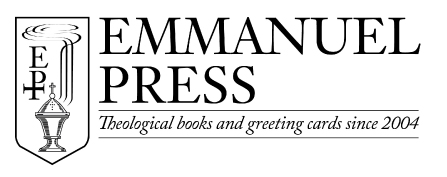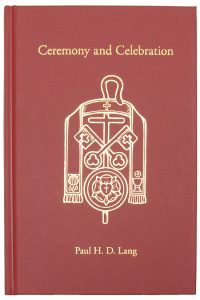THE LATEST NEWS
Lang on Traditional Rites and Ceremonies
“The danger of the traditional rites and ceremonies degenerating into formalism and even superstition has shown itself here and there in all ages. But the same danger is manifested in the use of nontraditional rites and ceremonies of the so-called informal churches. Because of that danger, some people have denounced all rites and ceremonies. But such denunciations solve nothing. First of all, it is impossible to live without some kind of rites and ceremonies, and secondly, the history of the church shows that the solution is not in trying to discard the traditional ceremonies, but in revitalizing them by constantly teaching their meaning and value.”
-Paul H.D. Lang in Ceremony and Celebration
Symposia Sale: All books up to 25% off
In honor of the annual Symposia at Concordia Theological Seminary in Fort Wayne next week, all of our books are on sale through Saturday, January 21! And if you’re planning to come, please note that there will not be an Emmanuel Press table at the Symposia next week, but you can place your order online and pick it up while you’re in town. (We’ll reimburse shipping.)
Explore our website by using the tabs above or the “word cloud” on the right sidebar. In addition, here are brief descriptions of each book:
*The Brotherhood Prayer Book (and CD) includes services for the day (Matins, Lauds, Prime, Terce, Sext, None, Vepsers, and Compline), the entire Psalter, daily and seasonal propers, and a Beichtspiegel unique to the BPB.
*Paul H.D. Lang’s Ceremony & Celebration gives a confessional apology for why the Lutheran Church is a liturgical church. It instructs in every aspect of the service, such as liturgical actions, liturgical space, and the church year. It explains why we do what we do.
*The Conduct of the Service describes what to do in the chancel, such as where to stand and how to move so that the emphasis remains on Christ and not on the liturgist.
*Prof. John Pless’s Didache uses the Bible, Luther’s Small Catechism, and the hymnal to instruct in a basic pattern of catechesis which expounds upon doctrine, liturgy, and vocation.
*An Explanation of the Common Service is an excellent supplement to Ceremony & Celebration in that it explains the actual words, or the rite, of the Divine Service. Read a review here.
*Liber Hymnorum: The Latin Hymns of the Lutheran Church is a collection of hymns taken exclusively from Lutheran hymnals and chant-books of the Reformation and post-Reformation era. It is two hymnals in one, the first half being English, the second Latin, exactly mirroring the first half in contents and numbering.
*The prayers in Wilhelm Loehe’s Seed Grains of Prayer contain collects for all occasions and are particularly good for personal devotion.
*Thy Kingdom Come and God With Us by Pr. David Petersen are books of sermons which are invaluable for homiletical ideas and for the devotional reading of good Law & Gospel sermons. In particular, Thy Kingdom Come offers over sixty sermons spanning Pre-Lent, all forty days of Lent, and the Sundays after Easter. Many customers find it to be an excellent daily devotion during Lent.
*What an Altar Guild Should Know gives details about church services, rubrics, altar care, sacred vessels, and other topics related to liturgical worship. However, anyone who is interested in liturgical worship will appreciate Lang’s keen theological insight into why reverence and beauty and the externals of worship matter.
In The Word Remains, Wilhelm Löhe gives insight into the confessional Lutheran understanding of the church year, the Word of God, and matters related to the Christian life.
Our newest Christmas card
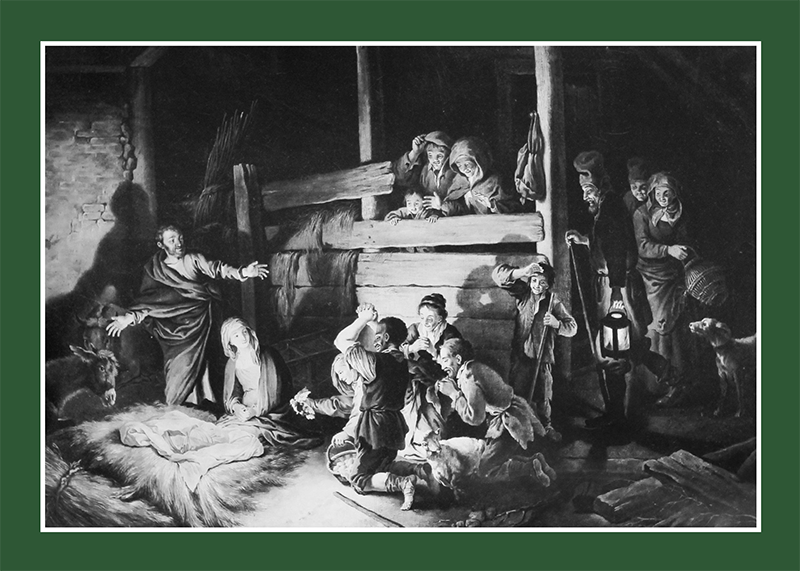
The Adoration of the Shepherds is an 18th-century oil painting by German artist C.W.E. Dietrich. Originally painted in color, our black and white version allows the light emanating from the infant Christ to shine within the darkness of the stable. The inside text proclaims: “Shepherds in the field abiding, watching o’er your flocks by night, God with us is now residing, yonder shines the infant light: Come and worship Christ, the newborn King!” (a verse from “Angels from the Realms of Glory”)
Visit our Christmas cards page to have a closer look at all 10 designs! New this year: you can now create a custom assortment of our unique Christmas cards to joyously confess our Savior’s birth.
Welcome, Listeners of Issues, Etc.!
 If you’ve found our website after hearing the commercial on Issues, Etc., we want to thank you for stopping by! Feel through to peruse the tabs above to learn more about our history and the books and greeting cards we offer. Several of our cards are pictured here; please visit our Christmas cards page for a closer look at all of the designs.
If you’ve found our website after hearing the commercial on Issues, Etc., we want to thank you for stopping by! Feel through to peruse the tabs above to learn more about our history and the books and greeting cards we offer. Several of our cards are pictured here; please visit our Christmas cards page for a closer look at all of the designs.
“The Holy Family” (left), an original painting by Lutheran artist Kelly Klages, is based on a beautiful 19th-century stained glass.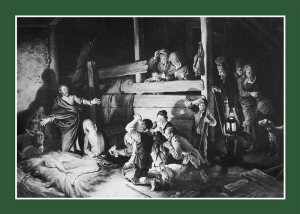
Our newest card, “The Adoration of the Shepherds” (right), is an 18th-century oil painting by German artist C.W.E. Dietrich. Originally painted in color, our black and white version allows the light emanating from the infant Christ to shine within the darkness of the stable.

In “Magnificat” (left), artist Meghan Schultz paired the depiction of Mary and Jesus (from “The Virgin of the Lilies” by 19th-century artist William-Adolphe Bouguereau) with hand-lettered words from the Song of Mary. She also added hand-drawn fleur-de-lis in the corners as a nod to Bouguereau’s French heritage and the lilies in his original piece, symbolic of Mary. The text inside features a verse from the beloved hymn, “Of the Father’s Love Begotten.”
 “Illumination” (left) is another original painting from Kelly Klages featuring the style of an illuminated manuscript with its decorated initial and elaborate border.
“Illumination” (left) is another original painting from Kelly Klages featuring the style of an illuminated manuscript with its decorated initial and elaborate border.
The artwork from “Nativity” (right) comes from the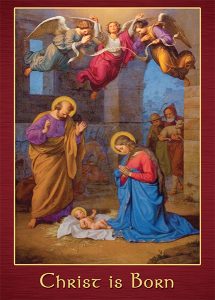 Imperial Cathedral of Speyer, Germany. These Nazarene-style frescos were painted in the cathedral’s interior walls in the mid-1800s by Johann von Schraudolph at the behest of King Ludwig I of Bavaria. The city of Speyer is significant in Reformation history; adherents of the Reformation were first called Protestants when they protested the Holy Roman Empire’s ban against Martin Luther and his teachings at an Imperial Diet in Speyer in 1529.
Imperial Cathedral of Speyer, Germany. These Nazarene-style frescos were painted in the cathedral’s interior walls in the mid-1800s by Johann von Schraudolph at the behest of King Ludwig I of Bavaria. The city of Speyer is significant in Reformation history; adherents of the Reformation were first called Protestants when they protested the Holy Roman Empire’s ban against Martin Luther and his teachings at an Imperial Diet in Speyer in 1529.
Thank you for visiting, and be sure to visit our Christmas cards page for a look at all of the cards and more details about the artwork.
Seed-Grains of Prayer: Longings for a Quiet and Peaceable Life
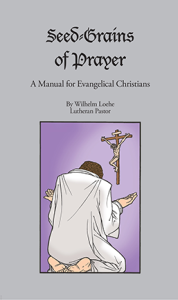 “Dear Lord, how miserably unreasonable it is that while the kingdoms of this world flourish and are sustained by the prayers of Thy Church, yet, at the same time, these do oppress and recklessly tread under foot Thy poor Church by whose prayers, faithfully offered, they are helped. For it is the Church alone, O God, whom Thou hast commanded to exercise care and diligence to pray for all in authority, as St. Paul has counseled (1 Timothy 2); and Thou hast so commanded because man needs peace, order, discipline, and safety to spread Thy Word, and by the Word to gather the Church. Grant, therefore, beloved Father, that under our government we may lead quiet and peaceable lives in all godliness and honesty, as may be well pleasing to Thee. Amen.”
“Dear Lord, how miserably unreasonable it is that while the kingdoms of this world flourish and are sustained by the prayers of Thy Church, yet, at the same time, these do oppress and recklessly tread under foot Thy poor Church by whose prayers, faithfully offered, they are helped. For it is the Church alone, O God, whom Thou hast commanded to exercise care and diligence to pray for all in authority, as St. Paul has counseled (1 Timothy 2); and Thou hast so commanded because man needs peace, order, discipline, and safety to spread Thy Word, and by the Word to gather the Church. Grant, therefore, beloved Father, that under our government we may lead quiet and peaceable lives in all godliness and honesty, as may be well pleasing to Thee. Amen.”
Wilhelm Loehe in Seed Grains of Prayer, #242

Let’s stay in touch! To receive the most current information on our products and new releases, join our email list today!
